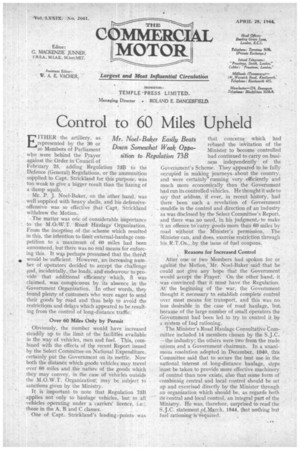Control to 60 Miles Upheld
Page 15

If you've noticed an error in this article please click here to report it so we can fix it.
EITHER the artillery, as represented by the 30 or so Members of Parliament who were behind the prayer against the Order in Council of February 25, adding Regulation 73B to the Defence (General) Regulations, or the ammunition supplied to Capt. Strickland for this purpose, was too weak to give a bigger result than the fizzing of a damp squib, Mr. P. J. Noel-Baker, on the other hand, was well supplied with heavy shells, and his defensive' offensive was so effective that Capt. Strickland withdrew the Motion.
The matter was one of considerable importance to the M.O.W.T. -RoadHaulage'Organization. From the inception of the scheme which resulted in this, the intention to limit external-haulage competition to a maximum of 60 miles had been announced, but there was no real means for enforcing this. It was pernaps presumed that the thre'al would be sufficient. However,_an increasing number of opetators. decided to accept the challenge and, incidentally, the loads, and. endeavour to provide that additional efficiency which, ft was claimed, was conspicuous by its absence in the Government Organization. In otherwords,, they found plenty of ,customers who were eager to send their goods by road and thus help to avoid the restrictions and delays which appeared to be result ., ing from the control of long-distance traffic.
Over al Miles Only by Permit • Obviously, the number would have increased steadily up to the limit of the facilities available in the way of vehicles, men and fuel. This, combined with the effects of the recent Report issued by the Select Committee on National Expenditure, certainly put the Government on its mettle. Now both the distance which goods vehicles may travel over 60 miles and the nature of the goods which they may convey, in the case of vehicles outside the M.O.W.T. Organization, may be subject to sanctions given by the Ministry.
It is important to note that Regulation 73B • applies not only to haulage vehicles, but to all vehicles operating under a carriers' licence, those in the A, B and C classes.
One of Capt. Strickland's leading, points was that concerns which had refused the invitation of the Minister to become controlled had continued to carry on business independently of the Government's Scheme. They appeared to be fully occupied in making journeys, about the country, and were certainly running very efficiently and much more economically than the Government had run its controlled Vehicles. He thought it safe to say that seldom-, if ever, in recent history, had there been such a revelation of Government . muddle in the control and direction of an 'industry as was disclosed by the Select Committee's Report, and there was no need, in his judgment,-to make It an offence to 'carry goods more than 60 miles by road without the Minister's permission. The Minister can, and does, exercise restriction through his ,R.T.Os., by the issue of fuel coupons.
Reasons foi• Increased Control After one or two Members had spoken for or against the Motion,' Mr. Noel-Baker said that he could not give any hope that the Government would accept the Prayer. On the other hand, it was convinced that it must have the Regulation. At the beginning of the war, the Government thought it necessary to establish Complete control over most means for transport, and this was no lessdesirable in the ease of road haulage, but. because of the large number of small operators the Government had been led to try to control it by a system of fuel rationing. The Minister's Road Haulage Consultative Committee included 14 members chosen by the S. J.C. —the industry; the others were two from the trade unions, and a Government chairman. In a unanimous resolution adopted in December, 1940, this Committee said that to secure the best use in the national, interest of long-distance haulage, steps 'must be taken to provide more effective machinery, .of control than no-w exists, also that some form of combining central and local control should be set up and exercised directly by the Minister through an organization which should be, as regards both its central and local control, an integral part of the Ministry. He was, therefore, surprised to read the S. j.C. statement .of,March, 1944, that nothing but fuel rationing is -required.




















































